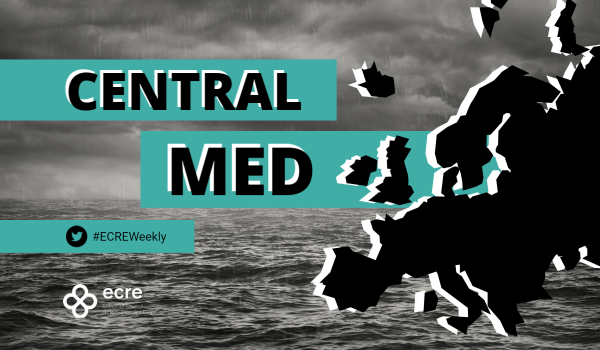Rescue activity on the central Mediterranean route remains high and death toll continues to raise. Germany announced it is stopping the training to the so-called Libyan Coast Guard for its implication in human rights violations. Pope Francis to address the issue of migration in his next visit to Malta.
IOM reports 299 dead or missing migrants on the central Mediterranean route in 2022 so far. The Search and Rescue organisation Sea-Watch International sets the number of dead or missing across the Mediterranean at 340, demanding “safe passage for all people on the move. So that no one has to flee across the Mediterranean, where Europe willingly lets people drown”. On 18-20 March 25 people were found dead on a beach in Tunisia; according to IOM, they had probably been in a boat carrying about 60 migrants and there are fears that the other 35 might have also drowned. According to IOM, some 8,000 people have died since 2014 attempting the trip to Europe from Tunisia and Libya, most of whom have drowned – however, a large number of people is also thought to have died in the desert. In two operations between 24 and 25 March, the Ocean Viking rescued 157 people and two people were found dead after spending more than 12 hours on a rubber boat; they all disembarked in Augusta, Sicily, on 29 March. On 28 March, Alarm Phone identified 32 people at risk drifting off Libya for days; they were rescued by a cargo ship and 50 hours later they were transferred to the Sea Eye 4, still awaiting disembarkation. On 30 March, 113 people were rescued by the Geo Barents vessel operated by Médecins Sans Frontières (MSF) from a rubber boat.
According to the International Organization of Migration (IOM) the number of migrants returned to Libya in 2022 as of March 26 amounts to 3,094. On 31 March the NGO hotline Alarm Phone reported of 145 people intercepted and forced back to Libya. The Office of the United Nations High Commissioner for Human Rights (OHCHR) has announced that the detention centres in Libya remain places of violations and of terrible and systematic abuse, that may amount to crimes against humanity. The head of the Fact-Finding Mission on Libya, Mohamed Auajjar, told journalists during the 49th Human Rights Council (HRC) session in Geneva that further evidence of serious human rights violations had been uncovered since October 2021. In the report submitted before the HRC, the Fact-Finding Mission regretted that “Libyan authorities have continued to detain migrants, including those intercepted at sea. European states continued to cooperate with the Libyan authorities including coastguards”, and recalled that “such cooperation should remain under the ambit of international human rights law obligations”. German authorities confirmed on 30 March that its military will no longer provide training to the so-called Libyan Coast Guard “in view of the repeated unacceptable behavior toward refugees and migrants, and also toward NGOs”.
Pope Francis has mentioned that the issue of migration will be the focus of his visit to Malta on 2-3 April. An increase of arrivals from Libya after June 2018 prompted Maltese authorities to sign an agreement with the Libyan government that relied on the so-called Libyan Coast Guard to intercept and “rescue” migrants and to return them to Libya, “even if migrants are clearly in distress within Malta’s SRR”, explained Katrine Camilleri, director of Jesuit Refugee Service in Malta. Recalling St Paul’s journey, whom Malta had welcomed on his way to Rome after being shipwrecked, Pope Francis stressed that Malta is now “even more committed to welcoming so many brothers and sisters seeking refuge“. NGOs described the Pope’s message as a clear call to the Maltese government on how it should treat migrants and refugees.
Malta held the latest hearing of the El Hiblu 3 on 3 and 8 February 2022, a case concerning three youths rescued at sea in 2019. Upon realising that the vessel that rescued them was sailing for Libya rather than Malta, the 108 survivors on board refused to disembark and were taken to Malta. The three boys were accused of ‘hijacking’ the cargo ship with alleged crimes ranging “from engaging in acts of terrorism, violence against people, detaining and threatening other people”. The case of the El Hiblu exposes “all that is wrong with how Europe treats migrants of color”, Lorenzo Pezzani, co-director of Border Forensics said on 26 March. The director of ECRE member organisation aditus foundation stated that after three years of being accused of terrorism, the three boys remained in a tortuous legal limbo, “They could live the rest of their lives in prison or they could not. We remain hopeful, in what is a dark and extremely complex case”, he said. In Italy, the former mayor of the small town of Riace is facing 13 years of imprisonment for allegedly aiding and abetting illegal migration. On 21 March, he lodged a final appeal against his sentence published last October. While insisting that he acted within the bounds of the law, he added that “inhumanity can be legality”.
For further information:
- ECRE, Central Med: Death Toll Continues to Rise on the Busiest Sea Route to Europe, March 2022
- ECRE, Central Med: Hundreds Rescued Yet Death Toll Continues to Rise, Frontex Covers Up Cooperation with Rogue Libyan Authorities, Protests in Tunisia, February 2022
This article appeared in the ECRE Weekly Bulletin. You can subscribe to the Weekly Bulletin here.

